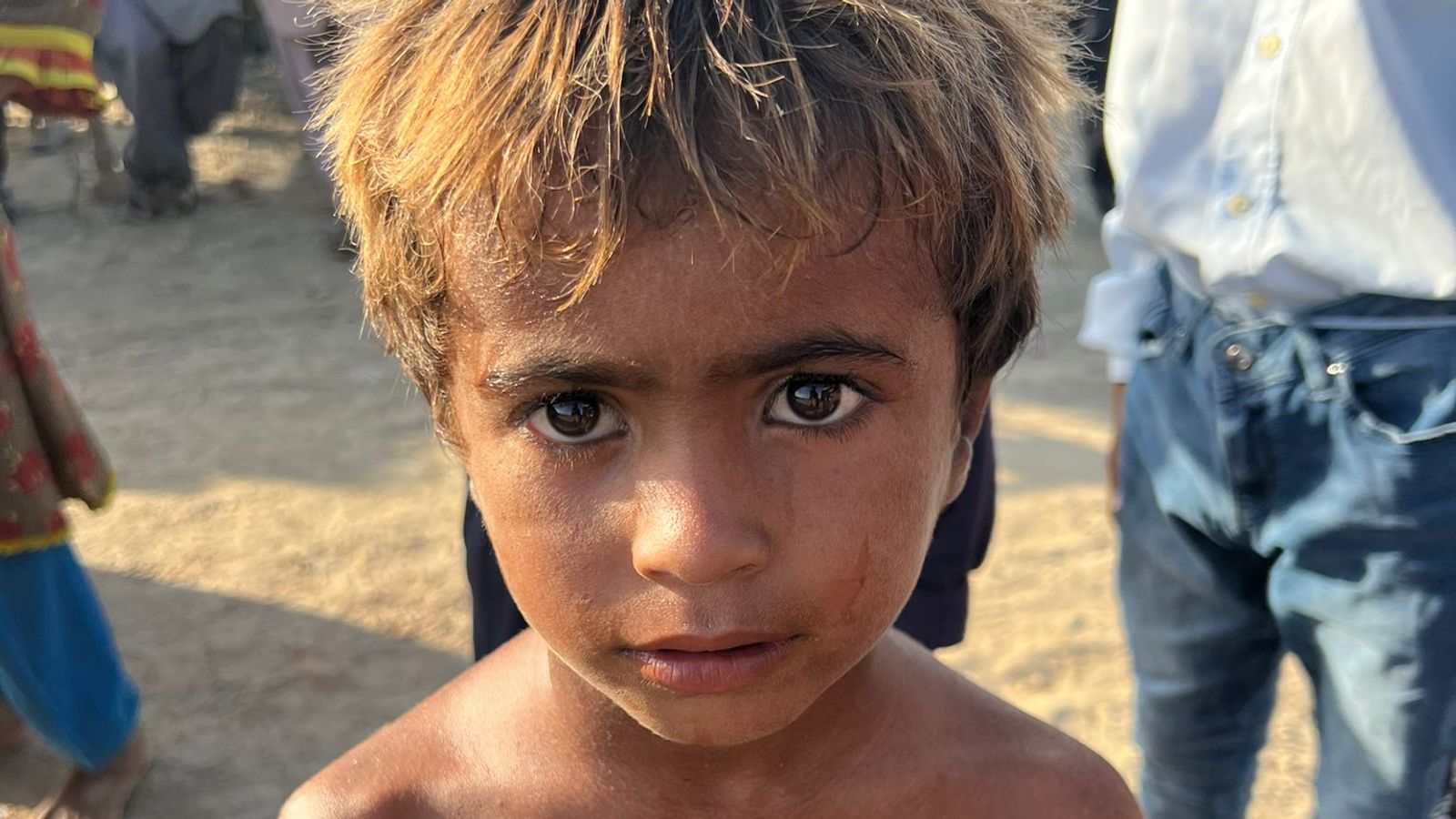Officials in the south of Pakistan have warned that more flooding is to come, with Lake Manchar swelling from unprecedented monsoon rains that have killed nearly 1,300 people.
Downpours in recent weeks have left devastation in their wake and been blamed on climate change.
Earlier this week, UN Secretary-General Antonio Guterres called on the world to stop “sleepwalking” through the deadly climate crisis.
The floods have affected more than 33 million people, or one in seven Pakistanis, with satellite images showing the devastation caused by the flooding.
Sky News international correspondent Saima Mohsin has seen the heart-breaking impact of the flooding firsthand – in the same part of the country where more flooding is thought to be on the way:
Over the past week we have tried to report every angle and really communicate what people here are going through.
After their escape, rescue and exodus, we wanted to show how people are living now. We found an entirely displaced neighbourhood that’s travelled from a village close to Manchar Lake to Dadu.
Pakistan floods: £13.5m raised for disaster relief efforts
Pakistan floods: Men trek 20 miles from cut-off town to get food for their stranded families
Watch live: Pakistan floods special
It’s as if the neighbourhood left their homes and set up home in a refugee camp. They remain neighbours, they still live down the way from one another.
Floodwater besieged their village in minutes in the middle of the night at 3am. And they all travelled here.
Many share their shelters side by side with their livestock – humans and animals – one as weak as the other, barely able to stand. But saving their livestock is an important lifeline.
I spotted Firaani Bibi – the wrinkles on her face told her story, with all the dignity and grace of her 96 years.
She tells me how terrifying it was when the water entered her family home in the middle of the night: “We are poor people and it was a mud and brick house.”
A wall collapsed on her legs. She’s in incredible pain. She’s been sitting on this wooden bed in the hot sun for three weeks. Relying on handouts from locals.
Waiting patiently for something to change. She tells me all she wants is to go home.
“I just about got away with my life,” she says.
“The water came like a river. There was so much water this old woman (referring to herself) almost got swept away by it. We almost drowned.”
All they have is their goat and her rusty walking frame.
She looked deeply in my eyes and told me: “See for yourself, do we have anything? Nobody is giving us anything. Nothing to drink. I am in pain.
“We are worried and suffering. We have no money to buy anything. We’re just sitting here. What can we do?”
Every time we get out of the car people approach us, some hope we are doctors, others hope we have brought food, some ask if we know if the water in their hometown has receded.
I meet Arbaab Khatun – she is young and confident and tells everybody to let me do my job.
We smile. I shake her hand and introduce myself.
She fled her home with five of her children. Her husband stayed back with the older ones. She doesn’t know if they are dead or alive.
Read more:
Men trek 20 miles from cut-off town to get food for their stranded families
‘No one came here to help’: Pakistan’s massive floods reveal the cost of global apathy
She tells me she wants to show me the state they are living in because it’s just not okay.
“Look at this!” She lifts the tarpaulin that is draped on some wooden posts to imitate a tent.
“It’s torn. We don’t even have a proper tent. It’s got holes in it everywhere, the sun is so strong. I’ve got small kids. My youngest has been very ill in this heat”
There’s a makeshift cradle for her toddler. A cloth tied at both ends to the posts to form a hammock.
“This is where the little one sleeps. All we have is the floor. We have nothing. I have these dishes. Nothing else. No food to cook. Everything’s empty.”
She throws the empty pots and pans to the ground in anger. In resentment.
She does not want to rely on handouts but feels she deserves at least more than this.
All they have is the clothes they were wearing when they fled and the few items she has shown me.
They have no shoes, her feet are bleeding – injuries from her escape.
Her children are riddled with mosquito bites, their eyes infected, swollen and red. The youngest, Khadija, is listless and caked in mud.
“We have nothing. We wake up, sit in the sun and go to sleep again. We have no rations, no food, no water – not even a sip of tea. Look!” She points to a terracotta pot on two bricks.
“That’s my stove. But there’s nothing on it. Just an empty chapati skillet.”
Some days they eat, some days they don’t. When the children cry it breaks my heart and I cry too, she tells me. “What else is there to do? What else can we do?”
And then she said something that broke my heart too.
“We are desperate. My little one has resorted to eating the mud. We have nothing.”








